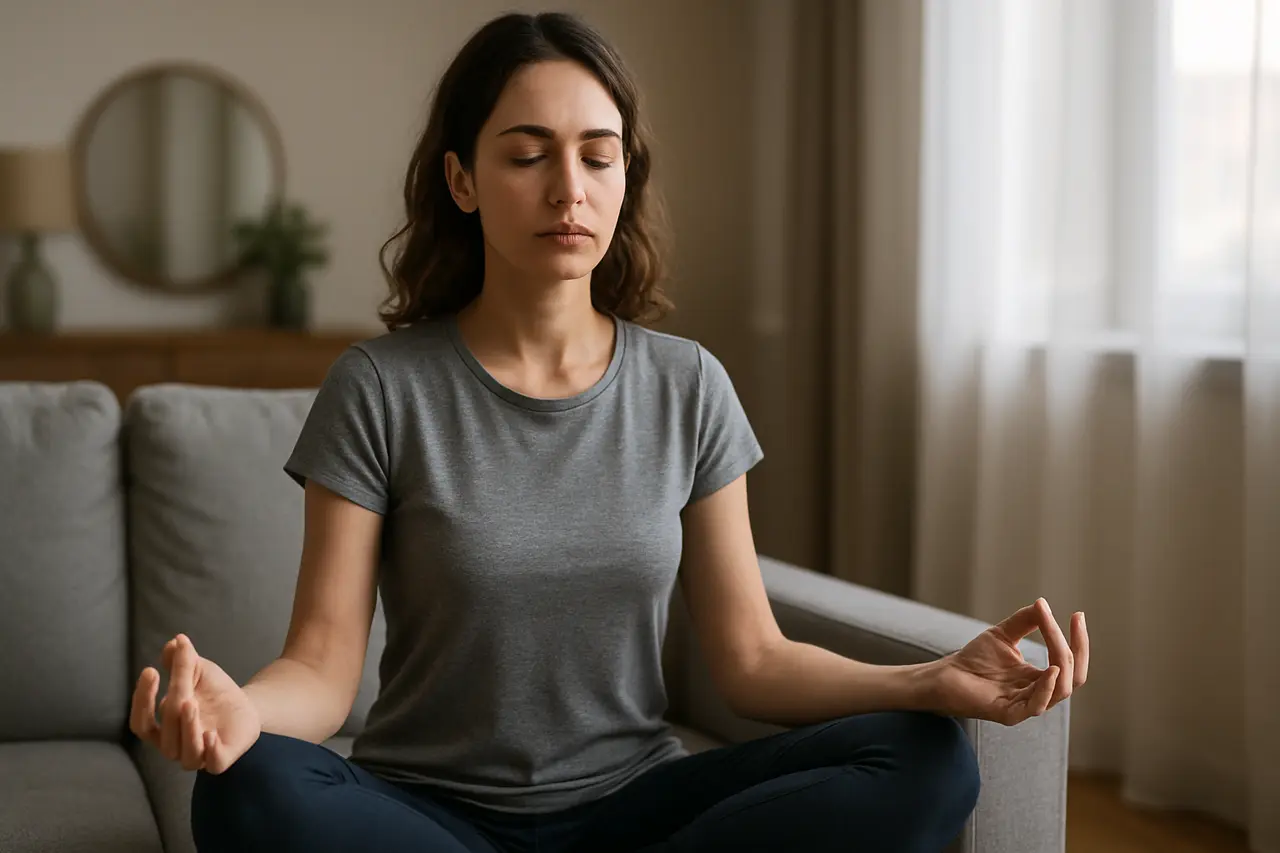Meditation for Anxiety: Mindful Steps to Reduce Anxiety and Stress

Meditation for anxiety offers a quick, science‑backed path to steady calm. Even a few minutes of daily practice trains the nervous system to respond instead of react. Large randomized controlled trials support meditation’s role in easing anxiety.
A landmark systematic review and meta‑analysis confirms meditation helps reduce stress and anxiety without side effects. The same evidence base links regular sessions to better stress management and sharper focus.
In this article, you will learn practical ways of dealing with anxiety through meditation. You will see how paying attention to the present moment lowers arousal and calms stress and worry.
When the mind wanders, simple breathing resets the body. You will also learn why mindfulness‑based stress reduction is a proven means to reduce anxiety and one of the most studied meditative therapies.

Understanding Anxiety
Anxiety and stress often rise together. The experience of anxiety may include rapid heartbeats, tight muscles, and racing thoughts. Common symptoms of anxiety also include trouble sleeping and constant worry.
Many people ruminate on worst‑case scenarios. That mental habit keeps the body’s alarm on high alert.
Anxiety and depression share overlapping neural circuits. Meditation helps both by dampening the fight‑or‑flight cycle and boosting mood‑regulating chemicals. Using meditation as a daily practice builds resilience and breaks the loop of negative thinking.
What Is Meditation for Anxiety?
Meditation is a practice that steadies attention on the present moment. When aimed at anxiety, it lets you observe thoughts and feelings without reaction. That detached view stops the rumination loop that feeds restless energy.
The effects of meditation extend beyond calm; regular sessions reshape the amygdala, a part of the brain that triggers fear.
Many forms of meditation share three core elements:
Each cycle rewires neural pathways and builds a non‑destructive response to stress and strain.
Key ideas:

How Does Meditation Help Reduce Anxiety?
Meditation reduces anxiety by shifting the body into parasympathetic mode. Slow breathing sends safety signals through the vagus nerve, lowering heart rate and blood pressure. Cortisol drops, muscles loosen, and clear thinking returns.
These results show that meditation works because it calms both mind and body at once.
What Types of Meditation Are Effective for Anxiety Relief?
Many forms of meditation reduce the feeling of anxiety. Choose a meditation program that fits your style.
| Forms of Meditation | Core Method | Best For |
|---|---|---|
| Mindfulness meditation | Breath focus and open monitoring | Generalized anxiety disorder, stress management |
| Mantra meditation | Repeating a sound or word | Racing thoughts that ruminate |
| Transcendental meditation | Personal mantra twice daily | Busy professionals who need structure |
| Loving‑kindness | Sending goodwill to oneself and others | Social anxiety and self‑criticism |
| Body scan | Progressive muscle relaxation with attention | Physical tension, insomnia |
| Guided imagery | Visualizing peaceful scenes | Panic attacks, agoraphobia |
| Yoga and tai chi | Movement with breath | Restless energy and somatic worry |
| Walking meditation | Slow, silent steps | People who struggle sitting still |
| Qigong | Flowing sequences and breathing | Fatigue and energy imbalance |
Jon Kabat‑Zinn’s mindfulness‑based stress reduction runs for eight weeks. It blends mindfulness meditation, gentle yoga, and body scans.
Mindfulness-based cognitive therapy builds on this. It adds thought‑reframing skills to help with anxiety and depression and prevent relapse.
Can Meditation Ease Anxiety Symptoms?
Yes. Meditation eases trembling, nausea, and rapid breathing in those who experience anxiety. Participants across types of anxiety disorders report relief within ten minutes of guided practice.
Controlled Study Insights
These meditative therapies for reducing anxiety work because they reset the nervous system quickly.

Benefits of Meditation in Managing Anxiety
Studies by the APA show that meditation delivers results across the mind and body systems.
What Are the Psychological Benefits of Meditation?
Meditation teaches you to see thoughts as passing events. You catch them early and label them. This skill prevents spirals. It also builds self‑compassion and stabilizes mood, key when depression and anxiety overlap.
Mindfulness‑based cognitive therapy uses these skills to prevent relapse. The approach trains flexible thinking, so you act instead of react. Mindfulness and meditation together make meditation a practical daily ally.
Subscribe to Create Higher Vibrations!
Get Inspiration and Practical advice straight to your inbox.
How Does Mindfulness Meditation Impact Anxiety Disorders?
Mindfulness meditation for anxiety shows solid evidence across diagnoses. A large randomized clinical trial found reduced worry in generalized anxiety disorder after eight weeks of group practice. Another study suggests that meditation lowers avoidance in social fear.
Mindfulness-based stress reduction also improves quality of life in panic disorder, negative thoughts, and obsessive‑compulsive tendencies. Tai chi adds gentle movement, boosting adherence among older adults.
The Role of Breathing Exercises When You Meditate
Breathing exercises anchor the mind quickly.
Calm breathing arises through paying attention to belly movement. This simple act delivers a non‑destructive response to stress.
Guided Meditation Techniques and Apps
Need structure? Try one of the following guided meditation sessions:
Using meditation tools removes guesswork and helps maintain streaks.
Discover Your Inner Self. Join Our Self-Mastery Program.
Self-Mastery Coaching gives you the space, tools, and guidance to grow, reflect and discover your values and inner strength.

Bringing Meditation Into Daily Life
Make meditation a habit:
Tracking progress in a notebook reinforces routine. Note mood, sleep, and any change in anxiety symptoms. This feedback loop shows that meditation is working.
Final Thoughts
Meditation for stress and anxiety relies on simple actions practiced every day. Attention to breath, clear observing of thoughts, and gentle returning build neural strength.
The health benefits of meditation cover the heart, mind, and emotions. Commit to ten minutes today. Over time, you will notice the effects of meditation in every choice you make.


